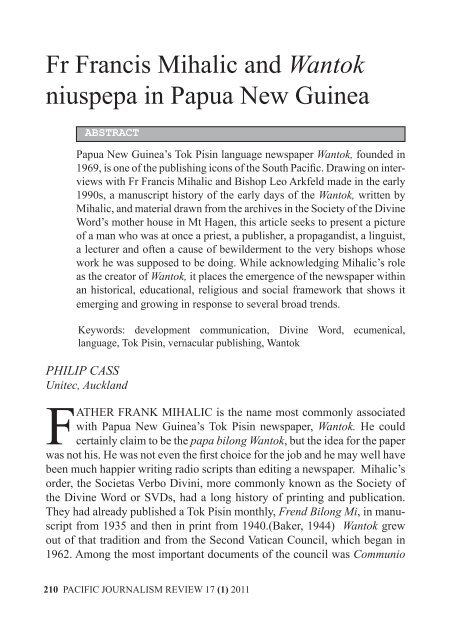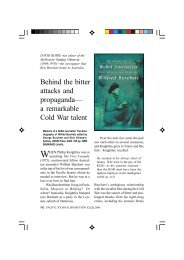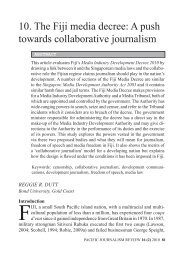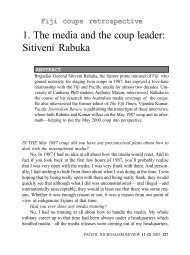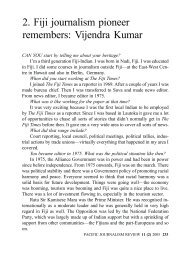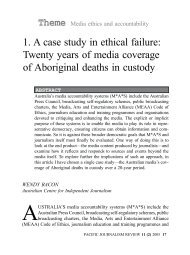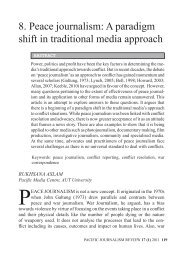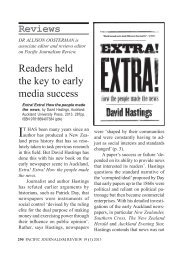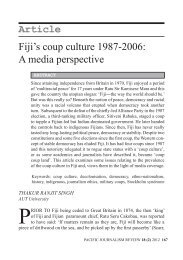Fr Francis Mihalic and Wantok niuspepa in Papua New Guinea
Fr Francis Mihalic and Wantok niuspepa in Papua New Guinea
Fr Francis Mihalic and Wantok niuspepa in Papua New Guinea
You also want an ePaper? Increase the reach of your titles
YUMPU automatically turns print PDFs into web optimized ePapers that Google loves.
INVESTIGATIVE JOURNALISM<br />
<strong>Fr</strong> <strong>Fr</strong>ancis <strong>Mihalic</strong> <strong>and</strong> <strong>Wantok</strong><br />
<strong>niuspepa</strong> <strong>in</strong> <strong>Papua</strong> <strong>New</strong> Gu<strong>in</strong>ea<br />
ABSTRACT<br />
<strong>Papua</strong> <strong>New</strong> Gu<strong>in</strong>ea’s Tok Pis<strong>in</strong> language newspaper <strong>Wantok</strong>, founded <strong>in</strong><br />
1969, is one of the publish<strong>in</strong>g icons of the South Pacific. Draw<strong>in</strong>g on <strong>in</strong>terviews<br />
with <strong>Fr</strong> <strong>Fr</strong>ancis <strong>Mihalic</strong> <strong>and</strong> Bishop Leo Arkfeld made <strong>in</strong> the early<br />
1990s, a manuscript history of the early days of the <strong>Wantok</strong>, written by<br />
<strong>Mihalic</strong>, <strong>and</strong> material drawn from the archives <strong>in</strong> the Society of the Div<strong>in</strong>e<br />
Word’s mother house <strong>in</strong> Mt Hagen, this article seeks to present a picture<br />
of a man who was at once a priest, a publisher, a propag<strong>and</strong>ist, a l<strong>in</strong>guist,<br />
a lecturer <strong>and</strong> often a cause of bewilderment to the very bishops whose<br />
work he was supposed to be do<strong>in</strong>g. While acknowledg<strong>in</strong>g <strong>Mihalic</strong>’s role<br />
as the creator of <strong>Wantok</strong>, it places the emergence of the newspaper with<strong>in</strong><br />
an historical, educational, religious <strong>and</strong> social framework that shows it<br />
emerg<strong>in</strong>g <strong>and</strong> grow<strong>in</strong>g <strong>in</strong> response to several broad trends.<br />
Keywords: development communication, Div<strong>in</strong>e Word, ecumenical,<br />
language, Tok Pis<strong>in</strong>, vernacular publish<strong>in</strong>g, <strong>Wantok</strong><br />
PHILIP CASS<br />
Unitec, Auckl<strong>and</strong><br />
FATHER FRANK MIHALIC is the name most commonly associated<br />
with <strong>Papua</strong> <strong>New</strong> Gu<strong>in</strong>ea’s Tok Pis<strong>in</strong> newspaper, <strong>Wantok</strong>. He could<br />
certa<strong>in</strong>ly claim to be the papa bilong <strong>Wantok</strong>, but the idea for the paper<br />
was not his. He was not even the first choice for the job <strong>and</strong> he may well have<br />
been much happier writ<strong>in</strong>g radio scripts than edit<strong>in</strong>g a newspaper. <strong>Mihalic</strong>’s<br />
order, the Societas Verbo Div<strong>in</strong>i, more commonly known as the Society of<br />
the Div<strong>in</strong>e Word or SVDs, had a long history of pr<strong>in</strong>t<strong>in</strong>g <strong>and</strong> publication.<br />
They had already published a Tok Pis<strong>in</strong> monthly, <strong>Fr</strong>end Bilong Mi, <strong>in</strong> manuscript<br />
from 1935 <strong>and</strong> then <strong>in</strong> pr<strong>in</strong>t from 1940.(Baker, 1944) <strong>Wantok</strong> grew<br />
out of that tradition <strong>and</strong> from the Second Vatican Council, which began <strong>in</strong><br />
1962. Among the most important documents of the council was Communio<br />
210 PACIFIC JOURNALISM REVIEW 17 (1) 2011
INVESTIGATIVE JOURNALISM<br />
et Progressio, which laid out a set of beliefs about the importance of communication<br />
<strong>in</strong> the life of the Catholic church. (www.vatican.va/roman_curia/pontifical_councils/pccs/documents/rc_pc_pccs_doc_23051971_communio_en.html)<br />
Communio et Progressio reflected the church’s commitment to work<strong>in</strong>g<br />
with the poorest people, someth<strong>in</strong>g that was especially important <strong>in</strong> places like<br />
the Territory of <strong>Papua</strong> <strong>and</strong> <strong>New</strong> Gu<strong>in</strong>ea where there was widespread illiteracy,<br />
poor nutrition, a high <strong>in</strong>fant mortality rate <strong>and</strong> constant fear of tribal warfare<br />
<strong>and</strong> sorcery <strong>in</strong> remote or recently contacted areas. <strong>Fr</strong> Jim <strong>Fr</strong>anks, who became<br />
head of <strong>Wantok</strong>’s parent company, Word Publish<strong>in</strong>g, said that <strong>Wantok</strong> was ‘a<br />
child of Vatican II’ whose job was to show that there was ‘a Christian as well<br />
as an economic <strong>and</strong> political viewpo<strong>in</strong>t’. (<strong>Fr</strong>anks, video, 1990)<br />
<strong>Fr</strong>om the beg<strong>in</strong>n<strong>in</strong>g, <strong>Wantok</strong> set out to serve the needs of ord<strong>in</strong>ary people<br />
<strong>and</strong> to provide them with a voice. Along with the news it has also brought to<br />
its readers political education, advice on social, agricultural <strong>and</strong> public health<br />
issues, education <strong>and</strong> human rights. Robie (2004) has described <strong>Wantok</strong> as ‘a<br />
benchmark of national development <strong>and</strong> the contribution that good journalism<br />
can make to education at grassroots level.’<br />
Some time <strong>in</strong> the early 1990s, <strong>Mihalic</strong> put together an account of the struggle<br />
to launch <strong>Wantok</strong>. ‘Pipe dreams vs Facts of Life: <strong>Wantok</strong>’s Wewak Years<br />
(1969-1976)’ can be viewed as an attempt to set the record straight from his<br />
po<strong>in</strong>t of view at a particular time <strong>in</strong> his life. He could reasonably have thought<br />
he had ended his work<strong>in</strong>g life <strong>and</strong> had time to look back <strong>and</strong> assess what he<br />
had done. <strong>Mihalic</strong> had been as tireless a propag<strong>and</strong>ist for <strong>Wantok</strong> as he was<br />
for Tok Pis<strong>in</strong> <strong>and</strong> this meant that his name became <strong>in</strong>delibly l<strong>in</strong>ked with the<br />
paper he started. However, it seems fair to place <strong>Wantok</strong> with<strong>in</strong> a tradition<br />
of SVD pr<strong>in</strong>t<strong>in</strong>g <strong>and</strong> to acknowledge that he had <strong>in</strong>itially been brought <strong>in</strong> to<br />
make somebody else’s idea a reality. Indeed, later <strong>in</strong> his life <strong>Mihalic</strong> reflected<br />
that most of his career had been devoted to help<strong>in</strong>g ‘to start someth<strong>in</strong>g or keep<br />
[it] go<strong>in</strong>g’(www.svd-ca.com/mihalic.htm).<br />
<strong>Mihalic</strong> is quite rightly honoured for his work as the founder of <strong>Wantok</strong>,<br />
but there are times, <strong>in</strong> his writ<strong>in</strong>gs <strong>and</strong> other communications, when, as with<br />
anybody driven by one goal, he can sometimes seem to have been <strong>in</strong>different<br />
to other people’s op<strong>in</strong>ions <strong>and</strong> s<strong>in</strong>gle m<strong>in</strong>ded <strong>in</strong> pursuit of his own objectives.<br />
‘Pipe Dreams vs Facts of Life’ presents a picture of a man who sometimes<br />
took a very caustic view of his religious confreres <strong>and</strong> the bus<strong>in</strong>ess of<br />
PACIFIC JOURNALISM REVIEW 17 (1) 2011 211
INVESTIGATIVE JOURNALISM<br />
runn<strong>in</strong>g a newspaper. However, it is doubtful whether a person not as<br />
apparently driven or s<strong>in</strong>gle m<strong>in</strong>ded could have brought <strong>Wantok</strong> <strong>in</strong>to be<strong>in</strong>g <strong>and</strong><br />
nursed it through its troubled early years.<br />
When I <strong>in</strong>terviewed <strong>Mihalic</strong> on Kairiru Isl<strong>and</strong> <strong>in</strong> April 1992 it was obvious<br />
that his confreres revered him, just as his journalism students at the Div<strong>in</strong>e<br />
Word University did. His fellow religious on Kairiru were solicitous of his<br />
health <strong>and</strong> concerned that I did not over-tire him. <strong>Mihalic</strong> gave me a copy of<br />
his manuscript with <strong>in</strong>structions that I was not to quote from it without his<br />
permission. His death has, I believe, freed me from that obligation.<br />
<strong>Fr</strong>ancis <strong>Mihalic</strong> was born to migrant parents <strong>in</strong> the United States on<br />
November 24, 1916 (Post-Courier, 2001, December 11). His father was<br />
Croatian, his mother Slovakian <strong>and</strong> he was one of ten children <strong>in</strong> a poor<br />
family. His was a conventionally Catholic family <strong>in</strong> an age when vocations<br />
were encouraged. <strong>Mihalic</strong> had completed high school <strong>and</strong> two years of tertiary<br />
education before he decided to become a priest <strong>and</strong> jo<strong>in</strong> the SVDs as a<br />
postulant. In an age when boys could enter a junior sem<strong>in</strong>ary <strong>in</strong> their teens,<br />
<strong>Mihalic</strong>’s was almost a late vocation. <strong>Mihalic</strong>’s mother was delighted when<br />
he was accepted <strong>in</strong>to the sem<strong>in</strong>ary, but his father was reported to have felt<br />
‘short-changed by the Lord’ (www.svd-ca.com/mihalic.htm) 1 .<br />
<strong>Mihalic</strong> was orda<strong>in</strong>ed <strong>in</strong> 1944. Hav<strong>in</strong>g studied philosophy, theology,<br />
Greek <strong>and</strong> Lat<strong>in</strong>, he also obta<strong>in</strong>ed a basic medical education at the Chicago<br />
College of Medical Technology. He was asked to stay <strong>in</strong> at the SVD sem<strong>in</strong>ary<br />
<strong>in</strong> Techny <strong>and</strong> teach physiology <strong>and</strong> geology until 1947 when he was ordered<br />
to what was then the Territory of <strong>Papua</strong> <strong>and</strong> <strong>New</strong> Gu<strong>in</strong>ea.<br />
Conditions throughout the Territory were chaotic, with almost noth<strong>in</strong>g<br />
left st<strong>and</strong><strong>in</strong>g after three <strong>and</strong>-a-half years of war. At the SVD’s headquarters<br />
<strong>in</strong> Alexishafen, which had once boasted its own brass b<strong>and</strong>, a horse-drawn<br />
railway <strong>and</strong> extensive coconut plantations, there was only rubble. The missionaries<br />
lived <strong>in</strong> what were little more than humpies made from scrap iron.<br />
Our homes are like our Lord’s tomb: close to the ground. They are<br />
ramshackle lean-to’s of termited timber hold<strong>in</strong>g aloft a t<strong>in</strong> roof- for<br />
the time be<strong>in</strong>g. We have gunny sack walls <strong>and</strong> ra<strong>in</strong>water for dr<strong>in</strong>k<strong>in</strong>g<br />
<strong>and</strong> wash<strong>in</strong>g. The work most of us priests did…[ ]…was anyth<strong>in</strong>g but<br />
clerical: overhaul<strong>in</strong>g Jeeps, servic<strong>in</strong>g diesel boat motors, haul<strong>in</strong>g supplies<br />
by air <strong>and</strong> l<strong>and</strong> <strong>and</strong> sea, sett<strong>in</strong>g up leftover army mach<strong>in</strong>ery <strong>and</strong><br />
build<strong>in</strong>g. (Matbob, 2010a)<br />
212 PACIFIC JOURNALISM REVIEW 17 (1) 2011
INVESTIGATIVE JOURNALISM<br />
<strong>Mihalic</strong> was sent to work <strong>in</strong> the Eastern Sepik District where he presided<br />
over the parish at Marienburg. Among his parishioners was a young Michael<br />
Somare, who would become PNG’s first Prime M<strong>in</strong>ister. While <strong>in</strong> the Sepik,<br />
<strong>Mihalic</strong> began to compile material on Tok Pis<strong>in</strong>. The SVDs had been the first<br />
missionary group to formally adopt Tok Pis<strong>in</strong> as a lotu language; that is, a<br />
language of evangelisation <strong>in</strong> the 1920s. They did this reluctantly, but it was<br />
a practical solution to the Babel of languages around them. The other missions<br />
<strong>in</strong> <strong>New</strong> Gu<strong>in</strong>ea, whether Protestant or Catholic, used Tok Pis<strong>in</strong> for day<br />
to day communication, but <strong>in</strong>sisted on us<strong>in</strong>g local languages—Tok Ples—as<br />
lotu languages, even if it meant, as the Lutherans did, impos<strong>in</strong>g a language<br />
from one place on another (Cass, P., 1997).<br />
A few months after his arrival <strong>in</strong> Marienburg, Leo Arkfeld, then Vicar<br />
Apostolic of Central <strong>New</strong> Gu<strong>in</strong>ea <strong>and</strong> later famous as the ‘fly<strong>in</strong>g bishop’ of<br />
Wewak, ordered <strong>Mihalic</strong> to rebuild the catechists’ school on Kairiru Isl<strong>and</strong>.<br />
(www.catholic-hierarchy.org/country/bpg.html) Then, disaster struck. With<br />
his somewhat basic medical education, <strong>Mihalic</strong> had been able to obta<strong>in</strong> a<br />
license as a medical assistant, but while fight<strong>in</strong>g the diseases rife <strong>in</strong> the area<br />
he contracted tuberculosis <strong>and</strong> <strong>in</strong> 1954, just six years after arriv<strong>in</strong>g <strong>in</strong> <strong>New</strong><br />
Gu<strong>in</strong>ea, he was repatriated to the United States<br />
While he was <strong>in</strong> a Californian sanatorium, he put together the material he<br />
had gathered <strong>in</strong> the Sepik <strong>in</strong>to what would become the first proper Tok Pis<strong>in</strong><br />
dictionary. Once he was out of hospital he enrolled <strong>in</strong> the Summer Institute<br />
of L<strong>in</strong>guistics language course <strong>and</strong> then started work on an MA thesis, but<br />
he was suddenly recalled to <strong>New</strong> Gu<strong>in</strong>ea <strong>and</strong> sent back to Kairiru. <strong>Mihalic</strong><br />
fell ill aga<strong>in</strong>, but this time he was sent to Par <strong>in</strong> what is now Enga Prov<strong>in</strong>ce.<br />
The mounta<strong>in</strong> air must have agreed with <strong>Mihalic</strong> because almost as soon as<br />
he arrived he was told that he was needed <strong>in</strong> Rome to help start the tertiate<br />
renewal programme.<br />
It was while he was <strong>in</strong> Rome that the idea of a Tok Pis<strong>in</strong> newspaper, perhaps<br />
to replace <strong>Fr</strong>end Bilong Mi or to meet the needs of a new audience, appears to<br />
have arisen. <strong>Fr</strong>om surviv<strong>in</strong>g documents the idea probably came from Adolph<br />
Noser, Vicar Apostolic of Alexishafen from 1953 <strong>and</strong> Archbishop of Madang<br />
from 1966 (www.catholic-hierarchy.org/country/bpg.html).<br />
Noser must have discussed the idea with his superiors, because a letter<br />
from the SVD Generalate to Noser dated 1964 survives, <strong>in</strong> which the project<br />
is discussed (SVD Generalate, letter, 1964). The names of a number of<br />
PACIFIC JOURNALISM REVIEW 17 (1) 2011 213
INVESTIGATIVE JOURNALISM<br />
suitable priests to take charge of the project are <strong>in</strong>cluded. <strong>Fr</strong> Bernie Fischer is<br />
mentioned, as is <strong>Fr</strong> Ralph Wiltgen, who had gone to Rome. So is <strong>Fr</strong> <strong>Mihalic</strong>,<br />
but the letter makes it clear that he wanted to stay <strong>in</strong> Rome <strong>and</strong> did not want<br />
to go back to PNG.<br />
Plans for a newspaper appear to have simmered for several years until,<br />
<strong>in</strong> 1967, the Bishops’ Conference of PNG asked him to come out from Rome<br />
<strong>and</strong> lay the foundations for a publication (Matbob, 2010a). <strong>Mihalic</strong> recalled:<br />
‘My job <strong>in</strong> Rome was by now runn<strong>in</strong>g itself; I looked at this ventur<strong>in</strong>g <strong>in</strong>to<br />
the unknown as a welcome challenge. I like challenges.’ (<strong>Mihalic</strong>, personal<br />
communication, 1993)<br />
<strong>Mihalic</strong> arrived <strong>in</strong> PNG <strong>in</strong> June 1967 to discover that noth<strong>in</strong>g necessary for<br />
the production of a newspaper existed. He was to suggest what was necessary<br />
<strong>and</strong> let the bishops decide what had to be done. There were only two pr<strong>in</strong>t<strong>in</strong>g<br />
presses that might serve his purpose, one at Vunapope, headquarters of the<br />
Missionaires du Sacre Coeur (the MSCs, otherwise known as the Sacred Heart<br />
mission) <strong>in</strong> <strong>New</strong> Brita<strong>in</strong>. The other was at the SVD mission at Wirui outside<br />
Wewak. <strong>Mihalic</strong>’s head was full of ideas—a newspaper here, a pr<strong>in</strong>t<strong>in</strong>g press<br />
there, a bookshop over yonder <strong>and</strong> profits to be made from every enterprise.<br />
These were what <strong>Mihalic</strong> would later call the pipe dreams that became reality.<br />
As he was to discover, that reality could be harsh <strong>in</strong>deed.<br />
What he was be<strong>in</strong>g asked to do was not, on the surface, too difficult: Start<br />
a newspaper for the <strong>in</strong>digenous people <strong>in</strong> Tok Pis<strong>in</strong> <strong>and</strong> do so <strong>in</strong> cooperation<br />
with another Catholic order which had a large pr<strong>in</strong>t<strong>in</strong>g press, a settled<br />
congregation, access to a distribution network <strong>and</strong> experience of produc<strong>in</strong>g<br />
publications <strong>in</strong> English, Tok Pis<strong>in</strong> <strong>and</strong> Kuanua.<br />
It was not go<strong>in</strong>g to be that simple. There was no settled Tok Pis<strong>in</strong> orthography,<br />
except the one that <strong>Mihalic</strong> had developed. Various efforts had been to<br />
put Tok Pis<strong>in</strong>’s house <strong>in</strong> order, but they had brought only partial order to the<br />
often wayward spell<strong>in</strong>gs <strong>and</strong> orthographic <strong>in</strong>exactitudes that plagued written<br />
versions of the language. There was a h<strong>and</strong>book of Tok Pis<strong>in</strong> for Adm<strong>in</strong>istration<br />
officers, <strong>Mihalic</strong>’s dictionary <strong>and</strong> soon there would even be a computerised<br />
concordance.(Laycock, 1970) There was a long history of different people<br />
attempt<strong>in</strong>g to establish one st<strong>and</strong>ard, people <strong>in</strong> Rabaul felt they knew how to<br />
spell Tok Pis<strong>in</strong> properly <strong>and</strong> so did people <strong>in</strong> Wewak <strong>and</strong> Madang <strong>and</strong> Lae<br />
<strong>and</strong> Port Moresby. Only <strong>in</strong> Samarai were they silent on the subject because<br />
<strong>in</strong> Milne Bay, as everybody there knew, they spurned Tok Pis<strong>in</strong> <strong>and</strong> spoke<br />
proper English.<br />
214 PACIFIC JOURNALISM REVIEW 17 (1) 2011
INVESTIGATIVE JOURNALISM<br />
The churches all used different versions of Tok Pis<strong>in</strong>. After the Adm<strong>in</strong>istration<br />
imposed its changes <strong>in</strong> education policy <strong>in</strong> the 1950s, the missions had<br />
to ab<strong>and</strong>on their Tok Ples schools <strong>and</strong> teach children <strong>in</strong> English <strong>in</strong> order to<br />
receive their Adm<strong>in</strong>istration subsidy. (Cass, L., 1975) This meant that the Tok<br />
Ples languages used by the Lutherans <strong>and</strong> Methodists <strong>in</strong> particular, Graged,<br />
Kate, Jabem <strong>and</strong> Kuanaua, had begun to imperceptibly lose their place as<br />
status languages as the language of the churches, the Tok Lotu, was slowly<br />
becom<strong>in</strong>g Tok Pis<strong>in</strong>.<br />
The greatest impetus <strong>in</strong> this direction was the decision by the Lutherans to<br />
translate the <strong>New</strong> Testament <strong>in</strong>to Tok Pis<strong>in</strong>. Other denom<strong>in</strong>ations were drawn<br />
<strong>in</strong>to one of the great ecumenical projects of the decade. The translation of the<br />
<strong>New</strong> Testament <strong>in</strong>to the Gutnius Bilong Jisas Kraist was a pivotal moment<br />
<strong>in</strong> the history of Tok Pis<strong>in</strong>. It cemented the status of Tok Pis<strong>in</strong> as the Tok<br />
Lotu <strong>and</strong> lifted it above the ord<strong>in</strong>ary categories of usage normally assigned<br />
to pidg<strong>in</strong>s (Cass, P., 2000).<br />
<strong>Mihalic</strong> arrived at a time when the first generation of school leavers to<br />
go through the Adm<strong>in</strong>istration’s all-English system were beg<strong>in</strong>n<strong>in</strong>g to leave<br />
school. Not all of them had made it to Form Four (grade 10). Many were<br />
frustrated because although they had never mastered English they knew Tok<br />
Pis<strong>in</strong>. They wanted to know what was go<strong>in</strong>g on <strong>in</strong> the world, but had noth<strong>in</strong>g<br />
available to meet their needs. Or had they?<br />
Nelson’s list of newspapers <strong>and</strong> magaz<strong>in</strong>es circulat<strong>in</strong>g <strong>in</strong> the Territory <strong>in</strong><br />
1967, the year <strong>Mihalic</strong> returned, <strong>in</strong>cludes a surpris<strong>in</strong>gly large number of Tok<br />
Pis<strong>in</strong> publications, 11 of them produced by missions <strong>and</strong> 13 by the Australian<br />
adm<strong>in</strong>istration (Nelson, 1967) (See Table 1). The fact that the Lutheran<br />
publications Kris Madang Totor <strong>and</strong> Aakes<strong>in</strong>g were pr<strong>in</strong>ted <strong>in</strong> both Tok Ples<br />
<strong>and</strong> Tok Pis<strong>in</strong> by the mid 1960s reflects the loss of an audience able to read<br />
<strong>in</strong> Tok Ples due to the Adm<strong>in</strong>istration’s education policies.<br />
Among the papers circulat<strong>in</strong>g at this stage was NuG<strong>in</strong>i Toktok, which<br />
had been produced on the north coast s<strong>in</strong>ce the early 1960s. It was edited by<br />
Muttu Jaw<strong>in</strong>g Gare, who had jo<strong>in</strong>ed the <strong>New</strong> Gu<strong>in</strong>ea Times Courier under<br />
the editorship of John Blair <strong>in</strong> 1959 <strong>and</strong> been encouraged to gather news for<br />
a Tok Pis<strong>in</strong> publication by Blair’s successor, John Huxley (Marsh, ANGH<br />
<strong>New</strong>sletter, 2004, December). NuG<strong>in</strong>i Tok Tok first appeared on 4 October<br />
1962. This was probably PNG’s first attempt at a commercial Tok Pis<strong>in</strong><br />
newspaper <strong>and</strong> pre-dated <strong>Wantok</strong> by eight years (Post-Courier, 2007, June 4).<br />
PACIFIC JOURNALISM REVIEW 17 (1) 2011 215
INVESTIGATIVE JOURNALISM<br />
Table 1: Tok Pis<strong>in</strong> publications <strong>in</strong> 1967<br />
Name Publisher Location Language<br />
Aakes<strong>in</strong>g Lutheran Mission Madang Kate/Tok Pis<strong>in</strong><br />
Catholic Action Catholic Mission Monoita English/Tok Pis<strong>in</strong><br />
Council Gazette Yabim-Kotte Council Yabim-Kotte Tok Pis<strong>in</strong><br />
Council <strong>New</strong>s Local Govt Council <strong>New</strong> Irel<strong>and</strong> Tok Pis<strong>in</strong><br />
Eastern Highl<strong>and</strong>s<br />
Councillor<br />
Eastern Highl<strong>and</strong>s<br />
Local Govt Council<br />
216 PACIFIC JOURNALISM REVIEW 17 (1) 2011<br />
Eastern Highl<strong>and</strong>s<br />
Tok Pis<strong>in</strong><br />
Hahela Parish Bullet<strong>in</strong> Catholic Mission Bouga<strong>in</strong>ville English/Tok Pis<strong>in</strong>/Tasi<br />
Harim<br />
Kamonrai<br />
Missionary Association<br />
of PNG<br />
Baluan Local Govt<br />
Council<br />
Port Moresby<br />
Manus<br />
Tok Pis<strong>in</strong><br />
Tok Pis<strong>in</strong><br />
Katolik Catholic Mission Vunapope Tok Pis<strong>in</strong><br />
Kris Madan Totor Lutheran Mission Madang Graged/Tok Pis<strong>in</strong><br />
Leiwompa Council<br />
<strong>New</strong>s<br />
Dept of Native Affairs Lae Tok Pis<strong>in</strong><br />
Lutheran Mission <strong>New</strong>s Lutheran Mission Madang Yabim/Tok Pis<strong>in</strong><br />
Madang District Council<br />
<strong>New</strong>s<br />
Ambenob, Waskia<br />
<strong>and</strong> Takia Local Govt<br />
Councils<br />
Ambenob,<br />
Waskia <strong>and</strong><br />
Takia<br />
<strong>New</strong> Gu<strong>in</strong>ea Lutheran Lutheran Mission Madang<br />
Nius Bilong Yumi<br />
Dept of Information<br />
<strong>and</strong> Extension<br />
Services<br />
Port Moresby<br />
Tok Pis<strong>in</strong><br />
St Michael’s Messenger Catholic Mission Kieta Tok Pis<strong>in</strong><br />
Different editions <strong>in</strong> English,<br />
Kate <strong>and</strong> Tok Pis<strong>in</strong><br />
Different editions <strong>in</strong> Tok<br />
Pis<strong>in</strong>, English <strong>and</strong> Motu<br />
Sunday Text Lutheran Mission Madang Tok Pis<strong>in</strong>/Graged<br />
Taladea Tavur Dept of Education Talasea Tok Pis<strong>in</strong><br />
Tamba Dept of Native Affairs Lae Tok Pis<strong>in</strong><br />
Tikana <strong>New</strong>s Dept of Native Affairs Kavieng Tok Pis<strong>in</strong><br />
Tok Tok Bilong Kaunsil Local Govt Council F<strong>in</strong>chhafen Tok Pis<strong>in</strong><br />
United Nations <strong>New</strong>sletter<br />
Wastaua<br />
United Nations Port Moresby Police Motu/Tok Pis<strong>in</strong><br />
International Bible<br />
Students Association<br />
(Jehova’s Witnesses<br />
Port Moresby<br />
Wewak <strong>New</strong>s Dept of Native Affairs Wewak Tok Pis<strong>in</strong><br />
Tok Pis<strong>in</strong>/ Pr<strong>in</strong>ted <strong>in</strong> English<br />
as Watchtower <strong>and</strong> as<br />
Gima Kohorona <strong>in</strong> Motu<br />
A sample of Tok Pis<strong>in</strong> publications <strong>in</strong> <strong>Papua</strong> <strong>New</strong> Gu<strong>in</strong>ea <strong>in</strong> 1967, the year <strong>Fr</strong> <strong>Mihalic</strong> returned to PNG to start work on<br />
what would become <strong>Wantok</strong>. Source: Nelson (1967).
INVESTIGATIVE JOURNALISM<br />
It was taken over by the Post-Courier when it merged with the <strong>New</strong> Gu<strong>in</strong>ea<br />
Times Courier <strong>and</strong> Gware became its editor (Post-Courier, 1969, June 30). He<br />
appears to have been the first <strong>New</strong> Gu<strong>in</strong>ean editor of a commercial newspaper.<br />
Described by Hast<strong>in</strong>gs <strong>and</strong> Hicks as a s<strong>in</strong>gle sheet <strong>in</strong>sert, it was distributed<br />
free to local government officers. It ran until 1970, <strong>and</strong> was then ‘laid to rest<br />
without ceremony’ (Hast<strong>in</strong>gs & Hicks, 1972, p. 860).<br />
In his recollections of the years lead<strong>in</strong>g up to the first publication of<br />
<strong>Wantok</strong>, <strong>Mihalic</strong> raised an important question: Why did the Catholic Church<br />
choose to produce a newspaper? Anybody look<strong>in</strong>g at the Territory at the time,<br />
he wrote, would have surmised that the only possible road the church could<br />
follow was radio. There had been several cases <strong>in</strong> Africa <strong>in</strong>volv<strong>in</strong>g failed<br />
pr<strong>in</strong>t<strong>in</strong>g exercises <strong>and</strong> it was deemed by the experts of the day that illiterate<br />
<strong>and</strong> widely scattered audiences could only be reached usefully <strong>and</strong> effectively<br />
with radio.<br />
In view of this trend…anyone who was plann<strong>in</strong>g to start a newspaper<br />
<strong>in</strong> a virtually illiterate Third World country as primitive as <strong>New</strong> Gu<strong>in</strong>ea<br />
was deemed psychologically suspect. To complicate the plot still more<br />
[I] had no property, no staff, no journalistic experience <strong>and</strong> no promise<br />
of any funds from the bishops. (<strong>Mihalic</strong>, MS, undated)<br />
<strong>Mihalic</strong> started his search <strong>in</strong> Vunapope, where, he said, Archbishop Hohne<br />
promised him a press, the use of ecclesiastical <strong>and</strong> lay staff <strong>and</strong> generally<br />
tried to persuade him that the Isl<strong>and</strong>s region was the best place to start a<br />
national Catholic newspaper because of its high rate of literacy (<strong>Mihalic</strong>,<br />
video, n.d). Archbishop Hohne presided over a large <strong>and</strong> very profitable diocese<br />
whose plantations <strong>and</strong> bus<strong>in</strong>ess <strong>in</strong>terests allowed it to operate <strong>in</strong> rather<br />
gr<strong>and</strong> style. As <strong>Mihalic</strong> told the story, the Archbishop offered him everyth<strong>in</strong>g<br />
he could want, <strong>in</strong>clud<strong>in</strong>g l<strong>and</strong>, staff <strong>and</strong> resources, but noth<strong>in</strong>g materialised<br />
(ibid.). He would later accuse the Rabaul Archbishop of everyth<strong>in</strong>g short<br />
of outright ly<strong>in</strong>g <strong>and</strong> accuse the MSCs of organis<strong>in</strong>g a campaign of sl<strong>and</strong>er<br />
aga<strong>in</strong>st him. Years later Bishop Leo Arkfeld would claim, <strong>in</strong> a voice that bordered<br />
between horror <strong>and</strong> mockery, that the Archbishop drove around Rabaul<br />
<strong>in</strong> a large car fly<strong>in</strong>g the papal flag (Arkfeld, <strong>in</strong>terview, 1992).<br />
After his <strong>in</strong>itial disappo<strong>in</strong>tment, <strong>Mihalic</strong> retired from the fray, but only for<br />
the moment. Into the breach stepped Bishop Arkfeld, who offered him a home<br />
<strong>and</strong> a pr<strong>in</strong>t<strong>in</strong>g press. With the aid of several SVD brothers <strong>and</strong> lay volunteers,<br />
the <strong>Wantok</strong> office was put together <strong>in</strong> less than four months.<br />
PACIFIC JOURNALISM REVIEW 17 (1) 2011 217
INVESTIGATIVE JOURNALISM<br />
While look<strong>in</strong>g for useful contacts <strong>in</strong> the run-up to the launch of <strong>Wantok</strong>,<br />
Ray Goodey, formerly <strong>in</strong> charge of the Vunapope press <strong>and</strong> now <strong>Mihalic</strong>’s<br />
right h<strong>and</strong> man, was— accord<strong>in</strong>g to one story—approached by the editor of<br />
NuG<strong>in</strong>i Toktok <strong>in</strong> Lae who wanted to know if he was <strong>in</strong>terested <strong>in</strong> buy<strong>in</strong>g a<br />
go<strong>in</strong>g concern rather than start<strong>in</strong>g a new paper. In Port Moresby, John Ryan,<br />
who ran the short-lived <strong>New</strong> Gu<strong>in</strong>ea <strong>New</strong>s Service was asked to supply copy<br />
to <strong>Wantok</strong>. Ryan said copy was supplied ‘on a friendly basis simply because<br />
I believed strongly <strong>in</strong> the concept that the more newspapers PNG had the<br />
better-<strong>in</strong>formed its people would be’ (Ryan, personal communication, 2006;<br />
<strong>in</strong>terview, 2006).<br />
Back <strong>in</strong> Wewak, the tra<strong>in</strong><strong>in</strong>g of local staff was underway. Goodey tra<strong>in</strong>ed<br />
Brian Namiat of Torembi <strong>and</strong> Albert S<strong>in</strong>ger of Kairiru as typists <strong>and</strong> taught<br />
<strong>Mihalic</strong> the basics of journalism. Meanwhile, Goodey’s wife <strong>Fr</strong>ancie tra<strong>in</strong>ed<br />
a group of young local women <strong>in</strong> typ<strong>in</strong>g, fil<strong>in</strong>g <strong>and</strong> book keep<strong>in</strong>g. They were<br />
Crescenti Clementi of Mushu Isl<strong>and</strong>, Maria Kovo<strong>in</strong>gre of Boik<strong>in</strong> <strong>and</strong> Jac<strong>in</strong>ta<br />
Jorgon of Marienburg. Jorgon began work<strong>in</strong>g for <strong>Wantok</strong> as a 15-year-old<br />
typesetter. She also helped with the circulation. Years later, Jorgon, who was<br />
still work<strong>in</strong>g for Wirui press, looked back on her days with <strong>Wantok</strong> with affection<br />
<strong>and</strong> declared that she loved every m<strong>in</strong>ute of it (Jorgon, <strong>in</strong>terview, 1992).<br />
Bishop Arkfeld presided over the launch of the first issue of <strong>Wantok</strong> on<br />
5 August 1970 (Figure 1). A school choir sang at the open<strong>in</strong>g <strong>and</strong> among its<br />
ranks was Anna Solomon, who would go on to become the paper’s editor<br />
<strong>and</strong> publisher.<br />
The late Sir John Guise [then Speaker of the House of Assembly]<br />
pressed the button to start the press roll<strong>in</strong>g...[ ]...little did I know then<br />
that many, many, years later I would be the first <strong>Papua</strong> <strong>New</strong> Gu<strong>in</strong>ean<br />
editor of that newspaper. (Solomon, <strong>in</strong>terview, 2007)<br />
The presses produced 7000 copies of what was to be a fortnightly paper,<br />
but gett<strong>in</strong>g rid of them proved harder than expected. Attempts to sell it <strong>in</strong><br />
the streets of Wewak failed because the schoolboys who were supposed<br />
to sell it baulked at the idea that people might th<strong>in</strong>k they were Jehovah’s<br />
Witnesses sell<strong>in</strong>g the Watchtower. However, the paper was successfully sold<br />
at Catholic churches <strong>in</strong> the Momase region where the SVDs predom<strong>in</strong>ated<br />
<strong>and</strong> Div<strong>in</strong>e Word University lecturer Patrick Matbob recalls his father<br />
buy<strong>in</strong>g it after mass. (Matbob, personal communication, 2007). Attempts to<br />
218 PACIFIC JOURNALISM REVIEW 17 (1) 2011
INVESTIGATIVE JOURNALISM<br />
Figure 1: <strong>Wantok</strong>’s first edition, 5 August 1970. The montage was made<br />
up of photos supplied by the Department of Information <strong>and</strong> Extension<br />
Services, which was always look<strong>in</strong>g for outlets for its work.<br />
PACIFIC JOURNALISM REVIEW 17 (1) 2011 219
INVESTIGATIVE JOURNALISM<br />
have the newspaper distributed <strong>in</strong> schools failed. <strong>Mihalic</strong> had expected that<br />
it would be a useful classroom tool, with its news stories <strong>and</strong> centrespread of<br />
government-supplied photos, but the Education Department was promot<strong>in</strong>g<br />
the use of st<strong>and</strong>ard English <strong>in</strong> schools <strong>and</strong> <strong>Wantok</strong> was not taken up (Cass,<br />
P., 1999). <strong>Fr</strong>ee bundles of the paper were sent to priests around the country<br />
with a suggestion that they be sold after mass on Sunday. <strong>Mihalic</strong> claimed<br />
that most priests refused to h<strong>and</strong>le the newspaper because it was not completely<br />
Catholic.(<strong>Mihalic</strong>, MS, n.d) 2<br />
<strong>Wantok</strong>’s first front page was a collage of official photographs provided<br />
by the Department of Information <strong>and</strong> Extension Services show<strong>in</strong>g various<br />
aspects of life <strong>in</strong> PNG. The paper had a crude, h<strong>and</strong>-made look about it, but<br />
s<strong>in</strong>ce its audience did not have any other source of pr<strong>in</strong>ted news, this did not<br />
matter. It created its audience as it went along. In a country where, as <strong>Mihalic</strong><br />
put it, there was no read<strong>in</strong>g habit, the newspaper had to create one (<strong>Mihalic</strong>,<br />
video, n.d).<br />
<strong>Fr</strong>om the start, <strong>Wantok</strong> was aimed at the grasruts, the villagers cut off<br />
from large scale development, the school leavers look<strong>in</strong>g for work <strong>and</strong> the<br />
urban dwellers, who might be public servants as much as drivers or haus<br />
bois. What they were most likely to have <strong>in</strong> common was an ability to read<br />
<strong>and</strong> write Tok Pis<strong>in</strong>.<br />
The newspaper devoted a great deal of attention to expla<strong>in</strong><strong>in</strong>g<br />
the chang<strong>in</strong>g political scene <strong>and</strong> expla<strong>in</strong><strong>in</strong>g basic concepts. <strong>Wantok</strong><br />
was broadly apolitical, but it certa<strong>in</strong>ly gave a lot of personal exposure<br />
to Michael Somare <strong>and</strong> the paper had very set op<strong>in</strong>ions on certa<strong>in</strong><br />
topics. Cargo cults were clearly bad, as were secessionists of any k<strong>in</strong>d.<br />
Margaret Mead was drafted <strong>in</strong> to declare that <strong>Papua</strong> Besena <strong>and</strong> the secessionists<br />
on Bouga<strong>in</strong>ville were longlong (mad) (<strong>Wantok</strong>, 23 July 1975).<br />
Accord<strong>in</strong>g to Matbob, the paper appealed to younger, literate people. One of<br />
the paper’s most popular features was the large letters section which, from<br />
the beg<strong>in</strong>n<strong>in</strong>g, attracted many students <strong>and</strong> teachers.<br />
The front page editorial for the paper’s 100th issue emphasised <strong>Mihalic</strong>’s<br />
major concern that Tok Pis<strong>in</strong> speakers had no source of <strong>in</strong>formation <strong>in</strong> their<br />
own language <strong>and</strong> that, unless this was provided, their education would be<br />
largely wasted:<br />
<strong>Wantok</strong> <strong>niuspepa</strong> i b<strong>in</strong> stat long yia 1970. Pater <strong>Mihalic</strong>, papa bilong em,<br />
i wari olsem: Hia long <strong>Papua</strong> Nu G<strong>in</strong>i ol Kristen mis<strong>in</strong> i save tromoim<br />
220 PACIFIC JOURNALISM REVIEW 17 (1) 2011
INVESTIGATIVE JOURNALISM<br />
planti mani i go <strong>in</strong>sait long of wok edukasen. Planti student i p<strong>in</strong>isim<br />
praimeri skul tasol, na bikpela la<strong>in</strong> gen i save lusim haiskul long Fom<br />
2. Tru, ol i no <strong>in</strong>ap ritim gut ol buk na <strong>niuspepa</strong> long tok Inglis.<br />
<strong>Wantok</strong> i wok long helpim ol dispela la<strong>in</strong> na ol narapela bikpela<br />
manmeri tu long ritim na raitim. Nogot edukasen bilong ol i pundaun<br />
nat<strong>in</strong>g. <strong>Wantok</strong> i wok long givim ol ka<strong>in</strong> ka<strong>in</strong> nius i laik kamap <strong>in</strong>sait<br />
long PNG - bilong gavman, bisnis, na ol mis<strong>in</strong> bai ol pipel i save gut<br />
long kantri bilong ol.<br />
(<strong>Wantok</strong> newspaper was started <strong>in</strong> 1970. <strong>Fr</strong> <strong>Mihalic</strong>, its founder, was<br />
worried that <strong>in</strong> <strong>Papua</strong> <strong>New</strong> Gu<strong>in</strong>ea Christian missions knew they had<br />
to spend a lot of money on education. Many students only f<strong>in</strong>ished<br />
primary school <strong>and</strong> many more left high school after form two [grade<br />
eight]. This meant they f<strong>in</strong>d it hard to read a newspaper or book <strong>in</strong><br />
English. <strong>Wantok</strong> wants to help all these people <strong>and</strong> adults to read <strong>and</strong><br />
write. Education shouldn’t be wasted. <strong>Wantok</strong>’s task is to br<strong>in</strong>g you all<br />
k<strong>in</strong>ds of news about government, bus<strong>in</strong>ess, missions <strong>and</strong> the people<br />
who know this country best.) (<strong>Wantok</strong>, 1974, September 18)<br />
<strong>Mihalic</strong>’s promotion of <strong>Wantok</strong> was fierce <strong>and</strong> s<strong>in</strong>cere, but he seems not to<br />
have noticed or understood that other people might be equally as fierce about<br />
their own language or l<strong>in</strong>gua franca. He poured scorn on priests <strong>in</strong> <strong>Papua</strong><br />
who objected to be<strong>in</strong>g asked to circulate a Tok Pis<strong>in</strong> newspaper <strong>and</strong> declared<br />
that if only they had a Motu paper, it might become the equivalent of <strong>Wantok</strong>.<br />
<strong>Mihalic</strong> always felt that he had to defend himself <strong>and</strong> the paper, particularly<br />
aga<strong>in</strong>st the charge that <strong>Wantok</strong> was <strong>in</strong>sufficiently Catholic. As he<br />
expla<strong>in</strong>ed time <strong>and</strong> aga<strong>in</strong>, it had never been <strong>in</strong>tended to be what he called ‘a<br />
mouthpiece for the bishops’. It had to be ecumenical to be truly Christian <strong>and</strong><br />
because advertisers would not use a medium restricted to a narrow market<br />
(Figure 2). The bishops, he claimed, rema<strong>in</strong>ed hostile or at best <strong>in</strong>different.<br />
<strong>Mihalic</strong> wrote to a friend that Bishop Noser had declared that the paper ‘had<br />
done no harm’ (The Word <strong>in</strong> PNG, 22 February 1975). As he ruefully noted<br />
on the paper’s 20th anniversary:<br />
I tru, ol bisop bilong PNG i b<strong>in</strong> givim namba wan aidia bilong kirapim<br />
dispela wok, tasol ol i no b<strong>in</strong> sapotim em tumas.<br />
(It’s true that the bishops <strong>in</strong>itiated this project, but s<strong>in</strong>ce then they have<br />
given little support.) (The Word <strong>in</strong> PNG, 1990, August)<br />
PACIFIC JOURNALISM REVIEW 17 (1) 2011 221
INVESTIGATIVE JOURNALISM<br />
Figure 2: Father <strong>Fr</strong>ank <strong>Mihalic</strong> (top left) <strong>and</strong> <strong>Wantok</strong> staff at the time of the 100th<br />
issue <strong>in</strong> 1974: Pius Pos (from left), Brian Namiat, Pater Cashmere, Joseph<strong>in</strong>e<br />
Tupa, Pater Jurczyga, Crescentia Lementi, <strong>Fr</strong>ancis Mana <strong>and</strong> Albert S<strong>in</strong>ger.<br />
222 PACIFIC JOURNALISM REVIEW 17 (1) 2011
INVESTIGATIVE JOURNALISM<br />
In 1976, <strong>Wantok</strong> moved to Port Moresby. Wewak was far away from the<br />
rest of the country <strong>and</strong> if the paper was to cover national events then it had to<br />
be near the seat of government. <strong>Mihalic</strong> gradually h<strong>and</strong>ed over the reigns of<br />
<strong>Wantok</strong> to <strong>Fr</strong> Jim <strong>Fr</strong>anks <strong>and</strong> for the next couple of years worked as a rov<strong>in</strong>g<br />
reporter for <strong>Wantok</strong>, The Times of PNG <strong>and</strong> <strong>New</strong> Nation. He also returned to<br />
his first love, radio features (<strong>Mihalic</strong>, personal communication, 1993).<br />
In 1983, he was asked to jo<strong>in</strong> the newly established Div<strong>in</strong>e Word Institute<br />
<strong>in</strong> Madang where he set up the journalism tra<strong>in</strong><strong>in</strong>g school <strong>and</strong> for the next<br />
eight years used his expertise <strong>and</strong> experience to tra<strong>in</strong> the country’s young aspir<strong>in</strong>g<br />
journalists (Matbob, 2010a). After an all too brief retirement, he went<br />
back to DWI to <strong>in</strong>spire another generation of PNG journalists. He gave his<br />
last lesson on 7 August 1997. One of his students, Patrick Matbob, quoted<br />
<strong>Mihalic</strong> as say<strong>in</strong>g:<br />
All I had was 12 years of experience <strong>in</strong> newspaper edit<strong>in</strong>g, news gather<strong>in</strong>g<br />
<strong>and</strong> report<strong>in</strong>g, proofread<strong>in</strong>g, typesett<strong>in</strong>g, page layout, advertis<strong>in</strong>g,<br />
distribut<strong>in</strong>g, photography <strong>and</strong> translation. (Matbob, 2010a)<br />
Matbob recalled <strong>Mihalic</strong> as us<strong>in</strong>g his own experiences on <strong>Wantok</strong> to teach<br />
the fledgl<strong>in</strong>g journalists. He soon became more than their teacher.<br />
He became ‘the old man’ <strong>and</strong> dur<strong>in</strong>g weekends we would comb the<br />
school gardens to collect pawpaw for him. Apart from news writ<strong>in</strong>g, I<br />
loved his feature writ<strong>in</strong>g classes... He also taught us photography from<br />
tak<strong>in</strong>g pictures to develop<strong>in</strong>g them <strong>in</strong> his small dark room. Tok Pis<strong>in</strong><br />
translation was another skill…which helped when we wrote for his<br />
baby, <strong>Wantok</strong> Niuspepa. I remember when I arrived <strong>in</strong> Port Moresby<br />
<strong>in</strong> 1985 to work…with <strong>Wantok</strong>, Anna Solomon, the editor, asked me<br />
to edit <strong>and</strong> lay out pages, take photographs, translate stories, <strong>and</strong> take<br />
down stories over the phone! No problem! Any of <strong>Mihalic</strong>’s students<br />
knew exactly what to do. (Matbob, 2010a)<br />
Conclusion<br />
<strong>Mihalic</strong> left PNG for the last time <strong>in</strong> 1999. He died <strong>in</strong> the United States on<br />
8 December 2001. Dur<strong>in</strong>g his lifetime, <strong>Mihalic</strong>’s work <strong>in</strong> PNG was<br />
recognised several times. His dictionary rema<strong>in</strong>ed <strong>in</strong> pr<strong>in</strong>t until 1983, he<br />
translated the PNG constitution <strong>in</strong>to Tok Pis<strong>in</strong>, wrote 30 books <strong>and</strong> was<br />
awarded an OBE <strong>and</strong> an honorary doctor of l<strong>in</strong>guistics by the national<br />
University of <strong>Papua</strong> <strong>New</strong> Gu<strong>in</strong>ea (UPNG) (Matbob 2010a).<br />
PACIFIC JOURNALISM REVIEW 17 (1) 2011 223
INVESTIGATIVE JOURNALISM<br />
<strong>Mihalic</strong> lived with an SVD community <strong>in</strong> California until his death. The<br />
community provide an onl<strong>in</strong>e memorial to <strong>Mihalic</strong> which quotes at length from<br />
a piece he wrote <strong>in</strong> 1994. In it he reflected on his motivation <strong>and</strong> his life’s work:<br />
Play<strong>in</strong>g second fiddle, do<strong>in</strong>g ancillary or supportive work has been the<br />
story of my life. It has meant be<strong>in</strong>g a stopgap to fill some temporary<br />
need, or be<strong>in</strong>g a spare part that either helps to start someth<strong>in</strong>g or keeps<br />
it go<strong>in</strong>g. The euphoria of be<strong>in</strong>g cont<strong>in</strong>ually needed could easily have<br />
<strong>in</strong>flated my ego had I not luckily chanced upon a very sober<strong>in</strong>g biblical<br />
text. One day I looked up the word ‘need’ <strong>in</strong> my concordance <strong>and</strong> was<br />
shocked to f<strong>in</strong>d out that only once <strong>in</strong> the entire <strong>New</strong> Testament had the<br />
Lord ever said that he had need of anyth<strong>in</strong>g. It was the time he was<br />
go<strong>in</strong>g up to Jerusalem. He said he had need of a jackass! I took the h<strong>in</strong>t.<br />
And ever s<strong>in</strong>ce, Luke 19:34 has become my text. You will f<strong>in</strong>d it on my<br />
desk, scrawled across a snapshot of a genu<strong>in</strong>e donkey patiently st<strong>and</strong><strong>in</strong>g<br />
at the Damascus Gate. I have always admired the supportive staff of<br />
any organisation, the players who run <strong>in</strong>terference for the ball-carry<strong>in</strong>g<br />
football star, the mechanics who keep planes fly<strong>in</strong>g, the ground crew<br />
who nurse the space shuttle…I have no regrets. I feel quite fulfilled <strong>in</strong><br />
hav<strong>in</strong>g played a secondary role. Given the chance, I would gladly do it<br />
all over aga<strong>in</strong>—only better (www.svd-ca.com/mihalic.htm).<br />
<strong>Fr</strong>ank <strong>Mihalic</strong> was not the first person to write a Tok Pis<strong>in</strong> dictionary—but<br />
he was the first person to write one that was successful <strong>and</strong> one that that is<br />
still regarded as the cornerstone of any work on Tok Pis<strong>in</strong>. He was not the<br />
first person to start a Tok Pis<strong>in</strong> newspaper, but he was the first person to start<br />
a Tok Pis<strong>in</strong> newspaper that became a national <strong>in</strong>stitution which serves the<br />
grasruts to this day.<br />
Notes<br />
1. The bulk of the material on <strong>Mihalic</strong>’s early life is drawn from this obituary.<br />
2. <strong>Mihalic</strong> says he sent it to ‘missionary confreres’. This may <strong>in</strong>dicate that it only<br />
went to SVD priests. If, however, he meant all Catholic priests, then it would have<br />
also gone to many districts where the Catholic church was represented by other<br />
missionary orders which perhaps did not take k<strong>in</strong>dly to be<strong>in</strong>g asked to act as vendors<br />
for an SVD publication. <strong>Mihalic</strong>, F., ‘Pipe Dreams vs Facts of Life…’<br />
224 PACIFIC JOURNALISM REVIEW 17 (1) 2011
INVESTIGATIVE JOURNALISM<br />
Interviews <strong>and</strong> personal communication<br />
Matbob, P. (2007, March 3). Personal communication with the author.<br />
<strong>Mihalic</strong>, <strong>Fr</strong>. F. (1992, April 11). Interview with the author, Kairiru Isl<strong>and</strong>, PNG.<br />
<strong>Mihalic</strong>, <strong>Fr</strong> F. (1993, August 20). Personal communication with the author.<br />
Ryan, J. (2006, March 7). Personal communication with the author.<br />
Ryan, J. (2006, June). Interview with the author, Rockhampton, Qld, Australia.<br />
Solomon, A. (2007, January 25). Personal communication with the author.<br />
References<br />
All Bishops of <strong>Papua</strong> <strong>New</strong> Gu<strong>in</strong>ea. Retrieved on 7 January 2011, from www.catholichierarchy.org/country/bpg.html<br />
Arkfeld, Bishop L. (1992, April 10). Interview, Div<strong>in</strong>e Word Institute, Madang.<br />
Baker, S. (1944). The literature of pidg<strong>in</strong> English. American Speech, 19(4).<br />
Cass, L. (1975, September 29). Educational changes <strong>in</strong> PNG. Interview with NBC.<br />
Cass, P. (1997). The apostolate of the press: Missionary language policy, translation<br />
<strong>and</strong> publication <strong>in</strong> German <strong>New</strong> Gu<strong>in</strong>ea. Unpublished MA thesis, Central<br />
Queensl<strong>and</strong> University.<br />
Cass, P. (1991). <strong>New</strong> Gu<strong>in</strong>ea’s first newspapers: The missionary press <strong>in</strong> German <strong>New</strong><br />
Gu<strong>in</strong>ea 1886-1914. Australian Journalism Review, 13(1-2), pp. 77-81.<br />
Cass, P. (1999) Tok pis<strong>in</strong> <strong>and</strong> tok ples as languages of identification <strong>in</strong> <strong>Papua</strong> <strong>New</strong><br />
Gu<strong>in</strong>ea. Media Development, 4; pp. 28-33.<br />
Cass, P. (2000). Yu mas kamap wan nesen: The ma<strong>in</strong>stream churches, tok pis<strong>in</strong> <strong>and</strong><br />
national identity <strong>in</strong> <strong>Papua</strong> <strong>New</strong> Gu<strong>in</strong>ea. Paideuma: Mitteilungen zur Kulturkunde,<br />
46; pp. 253-266.<br />
Communio et Progressio. (1971, May 23). Retrieved on 7 January 2011, from<br />
www.vatican.va/roman_curia/pontifical_councils/pccs/documents/rc_pc_pccs_<br />
doc_23051971_communio_en.html<br />
Fischer, <strong>Fr</strong> B. (1992, December). Interview, Div<strong>in</strong>e Word Institute, Madang.<br />
<strong>Fr</strong> <strong>Fr</strong>ancis <strong>Mihalic</strong> SVD: Great missionary, priest, newspaper editor, l<strong>in</strong>guist, education,<br />
man of ‘His Word’. Retrieved on 7 January 2011, from www.svd-ca.com/<br />
mihalic.htm<br />
<strong>Fr</strong> Jim <strong>Fr</strong>anks talks about Word Publish<strong>in</strong>g. (1990). Video, produced by Christian<br />
Communications Centre, Goroka.<br />
<strong>Fr</strong> <strong>Mihalic</strong> dies <strong>in</strong> California (2001, December 11) PNG Post-Courier.<br />
Hast<strong>in</strong>gs, P. <strong>and</strong> Hicks, I. (1972). <strong>New</strong>spapers <strong>and</strong> periodicals. In The Encyclopaedia<br />
of <strong>Papua</strong> <strong>New</strong> Gu<strong>in</strong>ea ( p. 860). Melbourne: Melbourne University Press.<br />
Jorgon, J. (1992, April 9). Interview, Wirui mission, Wewak.<br />
Life lessons from Father <strong>Mihalic</strong> (2001, December 12). PNG Post-Courier.<br />
Marsh, D. (2004, December). Obituary of Keith Matt<strong>in</strong>gley <strong>in</strong> Australian <strong>New</strong>spaper<br />
History Group <strong>New</strong>sletter.<br />
Matbob, P. 92010a). <strong>Mihalic</strong>—wantok tru bilong PNG. MS.<br />
Matbob, P. (2010b). <strong>Mihalic</strong> was my mentor. MS.<br />
PACIFIC JOURNALISM REVIEW 17 (1) 2011 225
INVESTIGATIVE JOURNALISM<br />
<strong>Mihalic</strong>, <strong>Fr</strong> F. (1986). Tok pis<strong>in</strong> yesterday, today <strong>and</strong> tomorrow. Catalyst, 16(2);<br />
pp. 89-99.<br />
<strong>Mihalic</strong>, <strong>Fr</strong> F. (n.d., but probably 1990-92). Pipe dreams vs Facts of Life: <strong>Wantok</strong>’s<br />
Wewak Years (1969-1976). MS.<br />
<strong>Mihalic</strong>, <strong>Fr</strong> F. (n.d., but probably 1990-92). The story of pr<strong>in</strong>t<strong>in</strong>g <strong>in</strong> the Wewak<br />
Diocese. MS.<br />
<strong>Mihalic</strong>, <strong>Fr</strong> F. (c.1990). Unedited footage of <strong>in</strong>terview shot at Div<strong>in</strong>e Word Institute,<br />
Madang.<br />
Nelson, H. (1967). The press <strong>in</strong> <strong>Papua</strong> <strong>and</strong> <strong>New</strong> Gu<strong>in</strong>ea. Paper presented at UPNG<br />
history research sem<strong>in</strong>ar, Waigani, October 25.<br />
Obituary of John Huxley (2007, June 4). PNG Post-Courier.<br />
Robie, D. (2004). Mekim nius: South Pacific media, politics <strong>and</strong> education. Suva:<br />
USP Book Centre.<br />
Stori Bilong <strong>Wantok</strong>. (n.d.). Video. Goroka: Christian Communications Centre.<br />
SVD Superior Generalate (1964).letter to Bishop Adolph Noser, 8 October 1964.<br />
The Word <strong>in</strong> PNG, (No.145, August 1990). No byl<strong>in</strong>e, but probably <strong>Mihalic</strong>.<br />
<strong>Wantok</strong>, 40 th anniversary edition, August 2010.<br />
Dr Philip Cass is post-graduate programme leader <strong>in</strong> the Department of<br />
Communication Studies at Unitec <strong>in</strong> Auckl<strong>and</strong>. He has been a journalism<br />
<strong>and</strong> media educator <strong>in</strong> the Arabian Gulf, Australia, Brita<strong>in</strong>, Fiji <strong>and</strong> <strong>Papua</strong><br />
<strong>New</strong> Gu<strong>in</strong>ea. His doctoral thesis, People, politics <strong>and</strong> press <strong>in</strong> <strong>Papua</strong> <strong>New</strong><br />
Gu<strong>in</strong>ea, 1950-1975, explored how the press <strong>in</strong> PNG reflected the rapid political<br />
<strong>and</strong> social changes from the end of the Second World War to the creation<br />
of an <strong>in</strong>dependent nation. This article is based on a paper presented to the<br />
Headl<strong>in</strong>ers journalism history conference, Mitchell Library, Sydney,<br />
November 2010.<br />
pcass@unitec.ac.nz<br />
226 PACIFIC JOURNALISM REVIEW 17 (1) 2011


